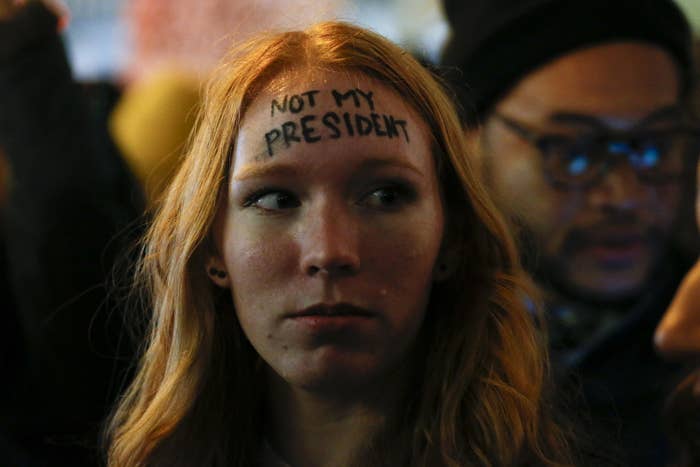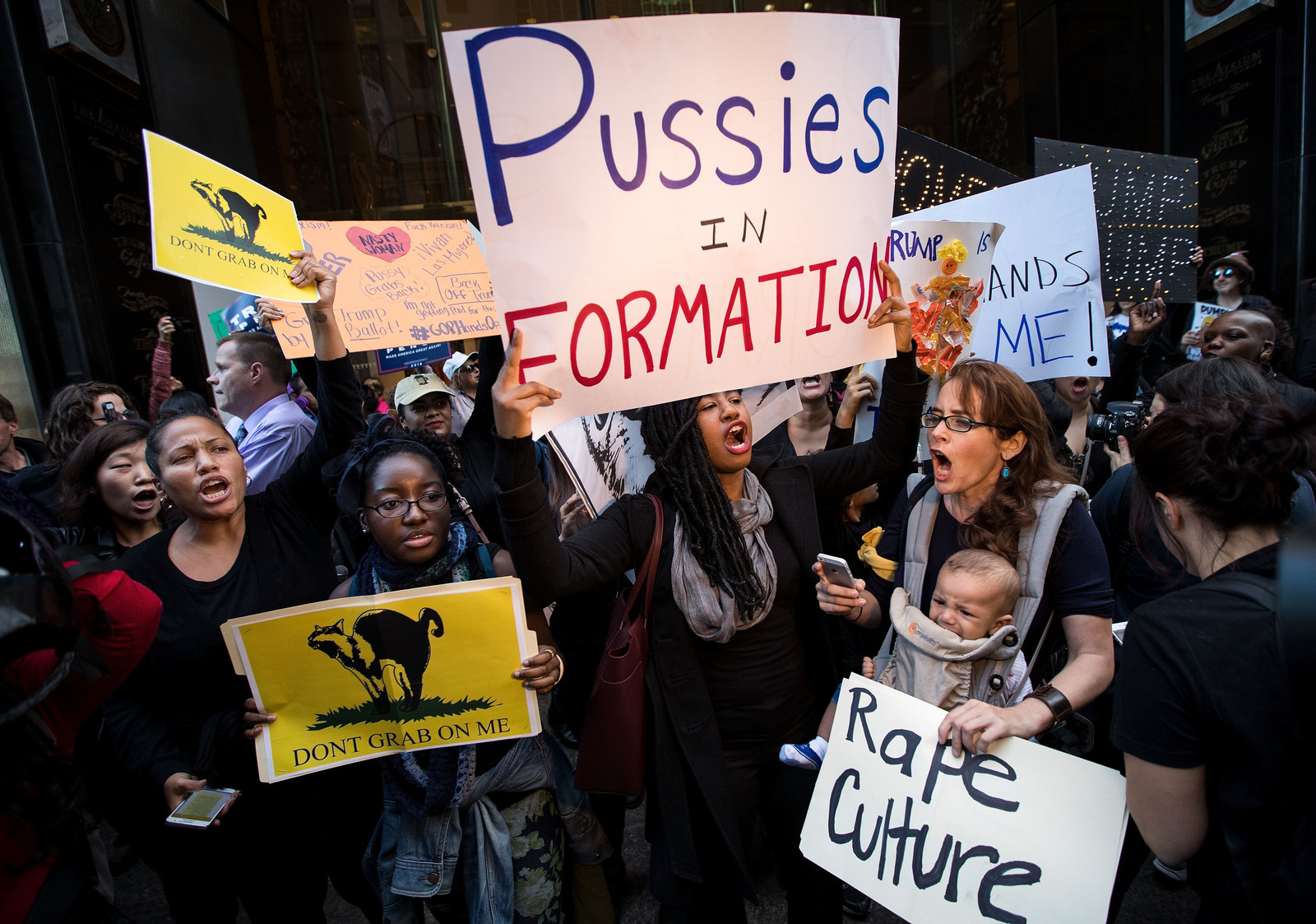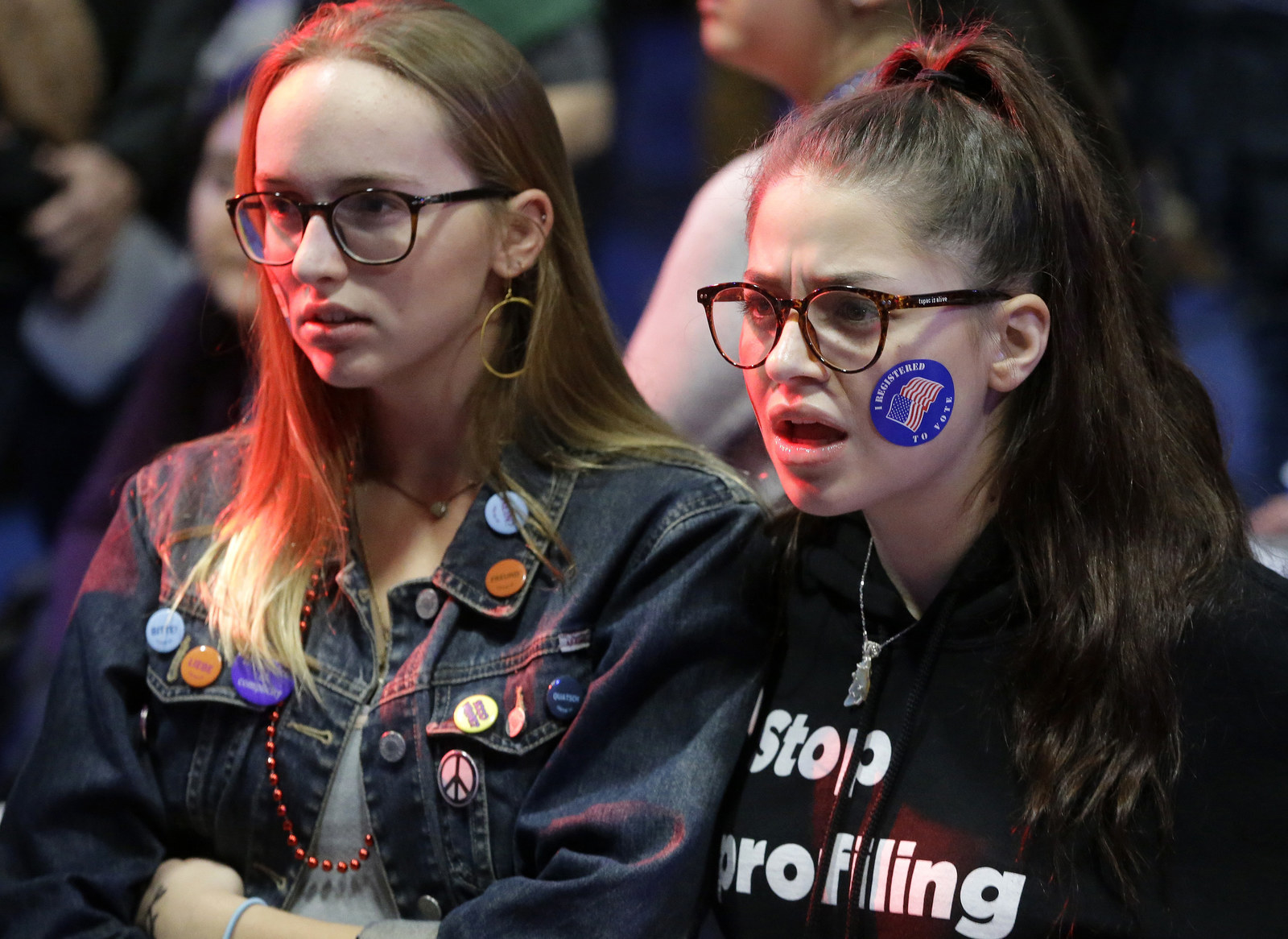
In July, alleged harasser Roger Ailes lost his job. In September, alleged rapist Bill Cosby got a trial date. In November, alleged groper Donald J. Trump was elected president. For women who watched all three events unfold in 2016, the old saying comes to mind: Two steps forward, one big-league step back.
In recent years, many Americans have called for a reckoning for famous men publicly accused of misogyny — the verbal kind, violent kind, or both. While 2014 was declared perhaps “the best year for women since the dawn of time,” 2016 brought the “moment for more women to speak up.”
The 2016 presidential campaign was caught up in that moment. President-elect Trump was accused of grabbing women’s breasts, reaching under their skirts, pinning and kissing them without consent, walking in on them changing, and more. The media resurfaced lewd comments he made to Howard Stern and Billy Bush.
Democrats and Republicans condemned Trump’s words; after the leak of his 2005 “grab them by the pussy” brag to Bush, Republican National Committee chairman Reince Priebus said “no woman should ever be described in these terms or talked about in this manner. Ever.” Democrats hoped the tape would be the end of Trump. The day of its release, Senator Elizabeth Warren of Massachusetts called Trump a “selfish little sleazeball, a man who will never be president of the United States” — and she was just talking about his taxes. But a month later, Trump won.
How did a country that seemed, at long last, intent on holding prominent men accountable for sexism elect a man so widely condemned as a sexist? This question weighs on Hillary Clinton’s supporters — particularly her female supporters — following her jolting defeat. The next question: How will women get through the coming four years?
"Just because we're having a conversation about sexism doesn't mean things have changed."
At Wellesley College on Tuesday night, as Clinton’s youngest voters watched their alumna’s chances dwindle, their brows increasingly furrowed. With cheeks tear-stained and mouths agape, they used words like “shattering,” “disheartening,” and “sickening” to describe their feelings.
“We’re first years,” freshman Alison Carey said, her voice strained. “And there’s this prospect of a man who’s said vile things about women being in the White House for the rest of our college careers.” Her friend Faye Washburn nodded, asking: “Are we going to get pushed back in time?”
Other than New York City’s Javits Center — where Hillary Clinton was expected to celebrate victory Tuesday night beneath a glass ceiling — and her Brooklyn campaign headquarters, Wellesley College’s field house may have hosted the most devastated election night watch party in America. Throughout the campaign, Clinton cited her time at Wellesley as part of her narrative of public service, sweeping the young women currently enrolled at the school into the frenzy of the election cycle. Like many others, Wellesley associate professor of women's and gender studies Irene Mata left the school’s party early Tuesday night.

On Thursday, as pundits attributed Clinton’s loss to Democratic voter turnout or an economically dissatisfied electorate, Mata had another theory.
“I think people don’t want to necessarily admit that we still live in a very sexist society. A lot of people still want to see Clinton’s loss as because of X, Y, and Z, but I don’t think we can take gender out of that equation.” It’s why, she said, voters ignored the crescendo of sexual assault allegations and misogynist revelations, despite thorough attention given to them by news organizations, pundits, and some politicians.
“Just because we’re having a conversation about sexism doesn’t mean things have changed,” Mata said.
But the “two steps forward, one step back” nature of Trump’s victory means that progress won’t stall or reverse — as the Wellesley women worried — said Deborah Tannen, professor of linguistics at Georgetown University and the author of the 1990 bestseller You Just Don’t Understand: Women And Men In Conversation.
“We’re going to see progress continue,” Tannen said, pointing to Anita Hill’s 1991 allegations against Supreme Court nominee Clarence Thomas. His eventual appointment to the court may have been considered a step back for women, but it was one that ushered in a new awareness of workplace sexual harassment.
“That doesn’t mean any of these behaviors will be stopped,” she said. “Sexism will never go away, but we’ve made a lot of progress and we’ll make more.”
"In every movement that people die for, the next generation doesn't really understand the sacrifices that were made."
“It’s hard to feel that in the moment, but we have” — made progress, that is — said Campbell Leaper, psychology professor at the University of California, Santa Cruz. He pointed to Hillary Clinton winning the popular vote as a “positive sign.”
Overall, Leaper said, the second day after Election Day was easier than the first. His immediate reaction to Trump’s election was “deep depression” at the “shocking awareness that we thought things were a lot better than they are,” he said. It seemed during the campaign that the criticism of Trump’s 2005 comments was “society recognizing this as unacceptable behavior,” he said. And then Trump’s election pointed to “a larger current that either supported it or weren’t offended by it.”
But does voting for a sexist make you sexist? That depends on which academic you ask.
“I’m not convinced that the American people are overwhelmingly sexist or racist or Islamophobic themselves. I don’t think electing Donald Trump means these are the values we embrace,” said Jennifer Lawless, a government professor at American University focused on political ambition and women in politics. “I do think the majority of the electorate doesn’t care he embraces it, and doesn’t find it disqualifying.”
This is where Leaper, a psychologist, draws a distinction between overt and covert sexism. If sexism played a role in Clinton’s loss, it wasn’t just Donald Trump’s overt “blood coming out of her wherever” version of it, Leaper argued. Pre-election polls may have been so wrong about Trump’s victory because “people didn’t want to admit they were going to vote for the sexist Donald Trump, but when they got in the ballot booth, they did it anyway,” he offered. That would be covert sexism, Leaper said, or secret or unconscious beliefs that emerge in indirect ways, like fudging the truth to a pollster. His theory complements the idea of the Ivanka Voter — the white woman who disagrees with Trump in public but votes for him in private.
Irene Mata believes there’s already a model for what sexism will look like on the ground in a Trump administration. When Obama was elected, “people wanted to believe we were living in a post-racial world, but in fact racism became much more evident,” she said, pointing to the country’s expanded awareness of police shootings of black men after their deaths drew protests that grew into a major movement.
Public displays of sexism will become more evident, too, and they’ve already started, Mata said. On Wednesday at Wellesley, two men drove through campus in a black pickup truck waving a Trump flag, allegedly harassing and spitting at women of color, according to students and faculty.
Mata called the incident “heartbreaking,” leaving “students in real crisis because they felt unsafe in a space that was especially created for women,” she said. “Donald Trump’s election has emboldened this behavior; if people voted for him knowing he sexually harassed and assaulted women and he was still elected, why should these men be held accountable for their actions?”
But Mata has told her students that it’s dangerous to stay in a place of fear and despondency for too long: “I said, ‘Your generation is changing things. You can’t be complacent.’”
Complacency is exactly the criticism that older generations of feminists, the women’s liberation warriors, level at young women. As Deborah Tannen explained, “In every movement that people die for, the next generation doesn’t really understand the sacrifices that were made.”

One option for young women devastated by Trump’s rise is to enter politics themselves. But Lawless said she worries they won’t — because women are already less likely to run for office than men, but also “because of what they just saw” happen to Clinton. Young women might get involved “behind the scenes, or mobilize around issues they care about, such as women’s right to choose,” Lawless said, but the “sexist terrain” of 2016 will discourage them from putting themselves in anything resembling Clinton’s shoes.
Lawless has a cynical view on the “one step back” phenomenon. “We’re not going to make progress, and let me tell you why: Because now that there’s unified party control, Congress is going to have less incentive to hold Trump accountable for any of his rhetoric or discourse that they might find offensive because they need to get their job done.”
Even if young women were to be incensed by the conservative policy heading for all three branches of government — or inspired to reject the stereotype of their complacency — “I don’t think there’s any reason to expect they’re more inclined to run for office themselves,” Lawless said.
There’s much talk, on Wellesley’s campus and many others, about the need to move forward. Before ending the election night party, Wellesley president Paula Johnson made an attempt to lift the dour mood. “The election may not turn out the way we had hoped,” Johnson told the stragglers. “Now more than ever we must be part of a momentum that takes us forward from this moment.”
But three days after the election, while the mushroom cloud of grief still hangs over the Democratic party, it’s unclear what moving forward looks like in practice.
Leaper, who has devoted research to when and how teenage girls become aware of sexism, said he’s found that girls who learn about the women’s movement or feminism early in life are more likely to be aware of sexism. His conclusion was that “learning about discrimination can be very empowering.”
For now, Leaper suggested, it’s the little things. He was heartened to see students walking out of classes in protest of Trump — actual teenagers leaving their high schools, rather than images we’ve seen more often of young adults staging walkouts at universities.
“That’s a hopeful sign,” he said. “But that’s also in Berkeley. It’ll be more hopeful when we see it happening somewhere like Indiana.”
